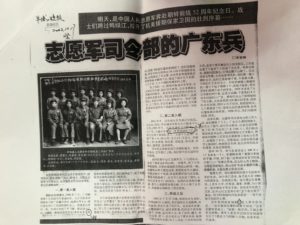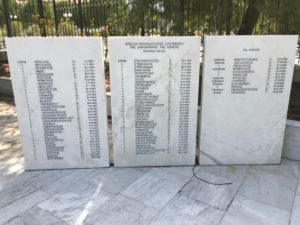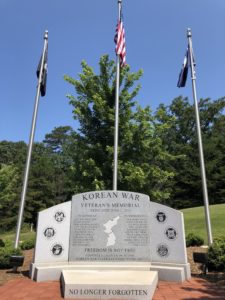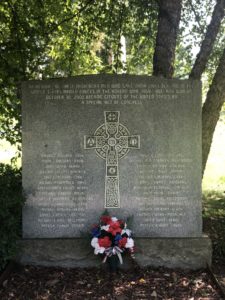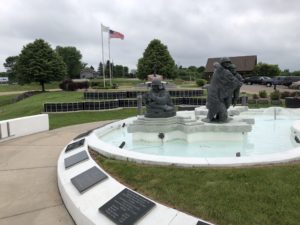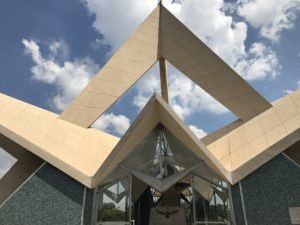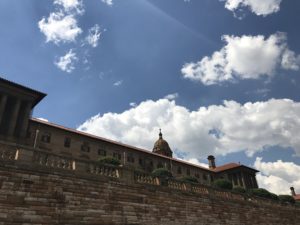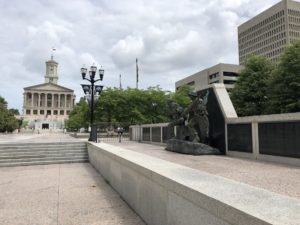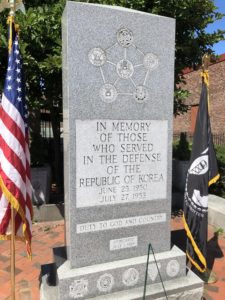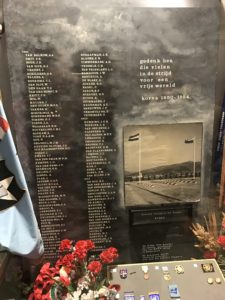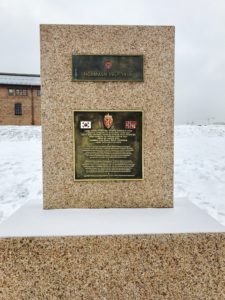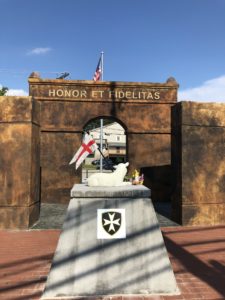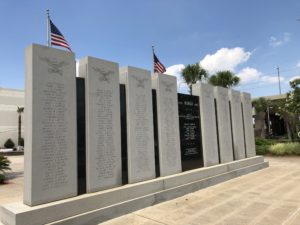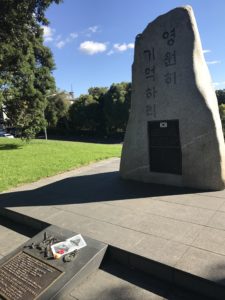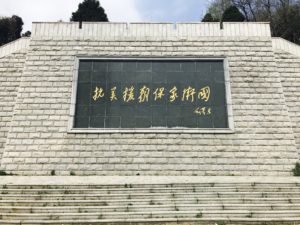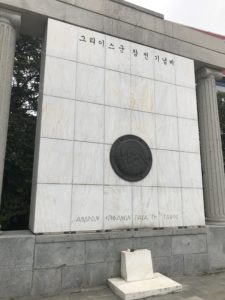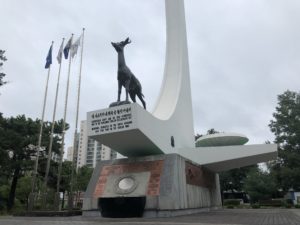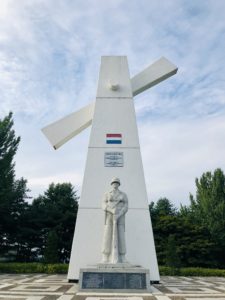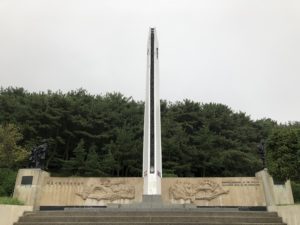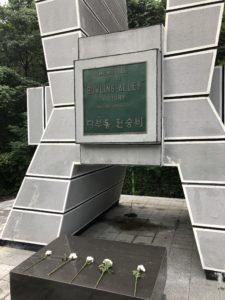>> My name is Ken Tashiro. My wife and I like to sing, and when we were living on the big island, I was inspired to write this song, and she helped me with the lyrics.
>> What is the song?
>> It’s “This Land is Your Land,” and it was written by Woody Guthrie, and it was sung by Pete Seeger. And so we took those words, and we made new words for it that applied to Korea. I was in Korea from July 4th, 1950. I was there 1 week after the war started. I was in Japan with the occupation, so this song details all the things that I’ve seen. I started out in Busan, went up to the [INAUDIBLE] and had the first battle and went up to …
[ Chatter ]
>> Okay. All right. And then we went up to North Korea, went to Pyongyang, and then we were 5 or 10 miles south of the Yellow River when the Chinese communists came in, and so we had to retreat, so …
>> Were you part of the Task Force Smith?
>> No. If I had been, I’m afraid I would’ve been dead, but we were … I was fortunate and got back, and got back south of Seoul, and then in June of 1951, I had enough points to rotate to go back to the mainland or to Japan, and since I had almost 10 months left, they had me sent to Japan. Then I got out May of 1952, so I almost spent 5 years in the army. But this song reflected my feelings and the third verse about the people that were killed and about the people who were wounded, and maybe they weren’t wounded in body, but they were wounded in mind or in the soul, so that’s what that came from.
>> Can you take it out, the lyrics, so I could show the lyrics?
>> Yes.
>> How long did it take you to write it?
>> [INAUDIBLE].
>> Okay.
>> [INAUDIBLE].
>> You know, here I was so surprised that you wrote against the armies of North Korea and the Chinese commies too. Many of your friends, your comrades in the chapters, they’re Chinese Americans, and, first of all, you as a Japanese American, what did it feel like to you? Because there’s a very complicated relationship between US and Japan at the time because it was right after World War II and Pearl Harbor, and you were here in Hawaii. And then, of course, the Japanese had colonialized Korea before, and so there was that very complicated relationship. So what, as a Japanese American … It’s not like you chose to make all of that happen. It was more political. What, as a young boy, how did it make you feel? It must’ve been so difficult.
>> Well, as a young boy during World War II, the Japanese Americans were evacuated from the West Coast. I was born and raised in California, and we were forced to leave there and go inland. And then we went to a camp in Gila River, Arizona, and we were in camp for 2 years. Then I was sent out because my dad, who was in the 442, he was an [INAUDIBLE], he was in the 442, but it didn’t make any difference. So we had to go to Minneapolis, and I went to high school there. And finally we got back to California, and then in 1947, I volunteered for the army.
>> Why did you want to volunteer? I would’ve been so angry, honestly.
>> Well, I’m a Christian, first of all.
>> Yes.
>> And so first, I felt very angry about the war, but then I decided that the war, it’s one of those things. There’s a saying in Japanese. [FOREIGN LANGUAGE]. It means, “Can’t be helped,” but anyway. So I went in the army. I went to army language school. I studied Japanese, and …
>> Did you face any discrimination in Korea?
>> Beg your pardon?
>> Did you face any discrimination or racism in Korea?
>> Well, yeah. In any situation, because of my face, I was often taken for the enemy, and so one thing that saved me was I knew a lot of swearing in American language. And I’d swear like that, and then they’d say, “Oh, he’s GI.” So, anyway.
>> My name is Earl Kalani Simerson. I went to Korea in 1950, July 1950. I followed after the 5th Regimental Combat Team had left before me. I was at that time at the [Indistinct] general’s office in 4th Chapter.
[ Chatter ]
>> You’re a local native Hawaiian. As a local native Hawaiian, what did you know about Korea and the Korean War before you went, and how did you feel about it after?
>> Before the Korean War, I didn’t know nothing about Korea, but after I went there, I left Korea. In Hawaii, well, we always had kimchi, so when I was in Korea, there was a lot of kimchi, so that was my meal, kimchi and rice. Still today, I still got kimchi and rice.
>> You had kimchi before you went to Korea?
>> Yeah.
[ Chatter ]
>> Wow.
>> [FOREIGN LANGUAGE] kimchi.
[ Chatter ]
>> Tell me about your experience in the war. Your experience in the war and after.
[ Chatter ]
>> In the beginning, I saw a lot of casualties, and as a young boy, I never seen this in my life, and so I couldn’t eat for 11 days. I was so upset. And after that, I started to eat, understand I got to eat. Otherwise, I’d die. But I learned a lot about the Koreans. They were very nice people. Everywhere we went, they were taking care of every soldier, and otherwise, that’s about all [INAUDIBLE].
[ Chatter ]
>> You can talk about anything you want.
[ Chatter ]
>> Whenever you’re ready.
[ Chatter ]
>> Well, one of the things that we were there, we didn’t have supplies, so I never changed clothes for 3 months. That’s how bad. There was no supplies, no clothing.
[ Chatter ]
My clothes was just like leather. Most of us, every time we went to take a shower, everything was frozen, and so we couldn’t take showers but … And we used to burn houses to keep warm because you had no facilities, and so as we advanced, we’d stand under a house with a cigarette lighter, keep warm. That was it, but we had no winter clothing. By the time April came, 52 of the supplies came. It was too late, but that was because of the war started, and then America wasn’t in any war at that time so unprepared for it, the Korean War.
>> You know Hawaii didn’t become a state officially until 1959?
>> Yeah.
>> And you were sent to Korea in 1950. I don’t understand.
[ Chatter ]
>> Yeah, well, we were a territory of the United States.
>> I know, so did you volunteer, or were you drafted?
>> I volunteered in the Army.
>> Why would you want to volunteer for? Technically it wasn’t even your country.
>> Well, I volunteered in 1948. There was no jobs. Well, most of us all … After you got out of high school … Because of the second war, my parents went broke. We lost everything due to the Second World War so couldn’t go to college, so after I graduated from high school, joined the Army. Most of us all did. We joined the Army to get income, I guess, because at that time, there weren’t many jobs around.
[ Chatter ]
But that was one of the reasons why. Yeah.
[ Chatter ]
>> That makes me sad because you risked your life.
>> What’s that?
>> That makes me sad because you had to risk your life.
[ Chatter ]
It makes me sad because you had to risk your life for it.
>> Yes. When I think of it, oh, my god, I was lucky, but thank God.
[ Chatter ]
All my friends got wounded or were killed in action.
[ Chatter ]
So I’m thankful for what I have today.
[ Chatter ]
>> Thank you.
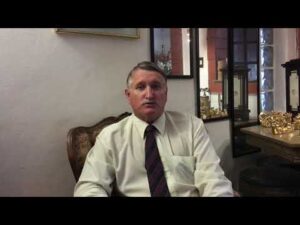
>> [FOREIGN LANGUAGE]
>> My name is Tom Harsalehr.
>> [FOREIGN LANGUAGE]
>> I’m 87 years old.
>> [FOREIGN LANGUAGE]
>> When I was 22, I left, in 1950 … January 1953, and I came back in 1954.
>> But it was great.
>> It was radio work.
>> In Korea, my job was a radio man. [FOREIGN LANGUAGE]
>> I was a radio man, and I was up with the commanders, commanding officers. My children know nothing at all about my past, and I want to keep it that way.
>> Why?
>> [FOREIGN LANGUAGE]
>> Because I lost my two best friends there.
>> Hmm. How?
>> Killed.
>> Killed in action.
>> Killed in action.
>> Hmm, it must have been very painful.
>> Mm-hmm.
>> But you served, and you made a sacrifice, and something great came out of it, and aren’t you proud? Don’t you want to share that with your children?
>> [FOREIGN LANGUAGE]
>> I’ve always found it extremely difficult to talk about this.
>> Even after almost 70 years?
>> I have everything here and here. It’s for me and not for other.
>> Well, how about maybe not your personal, but how about your … Well, how about this? In war …
>> Yes.
>> There’s a lot of pain and suffering, but sometimes, there’s also humanity.
>> Mm-hmm.
>> Like caring for the civilians, kids, I hear a lot about veterans remembering, soldiers remembering orphans. Do you remember anything like a touching story of humanity? You mentioned “M*A*S*H,” something laughing, something funny.
>> I got three friends over there, three dogs.
>> Three dogs?
>> Yes.
>> You had three dogs?
>> Three dogs.
>> Oh.
>> That’s after the war.
>> After the war, when you were a cook?
>> Yes.
>> Yes, do you remember their names?
>> I’ve got everything. No, I don’t know, but I can give to the dogs anything.
>> Yeah, dogs are man’s best friend. Well, so you mentioned that two of your best friends died, and I know 124 Dutch men, servicemen died. What do you think is … What do you think other people should know about the Dutch service?
>> [FOREIGN LANGUAGE]
>> Something different about Dutch service than other …
>> You mean what they do over there in Korea?
>> Whether what you did or what you think is very important, like protecting …
>> [FOREIGN LANGUAGE]
>> … other soldiers, and …
>> [FOREIGN LANGUAGE]
>> I will need … He doesn’t want to to discuss the extraordinary things that were particularly Dutch because …
>> No.
>> … of his friends.
>> No, but … No, I’m not talking about personal story. I’m talking about, well, numbers. You’re part of the Association. What … Why is the Association important? Why do you think Dutch or the rest of the world should remember this war? Because it’s called the Forgotten War.
>> [FOREIGN LANGUAGE]
>> [FOREIGN LANGUAGE]
>> Yeah, I …
>> [FOREIGN LANGUAGE]
>> Yeah, no, that’s my friends [FOREIGN LANGUAGE]
>> I have … These are my comrades here, but we never talk about the things that we have personally experienced in the war.
>> I know, but I’m not talking about personal experience.
>> No.
>> I’m talking about …
>> No? Okay.
>> [FOREIGN LANGUAGE]
>> [FOREIGN LANGUAGE]
>> The important thing about this Association …
>> The Forgotten War.
>> … is that it’s … It remembers the Forgotten War that Dutch history books forgot, literally, and it is hardly taught at school [FOREIGN LANGUAGE]
>> [FOREIGN LANGUAGE]
>> I was introduced to the Korea Association by a Mr. Ralph who came to see me at home and told me about this, and that’s why I became a member.
>> [FOREIGN LANGUAGE]
>> I go to the annual ceremonies.
>> [FOREIGN LANGUAGE]
>> And I accompany all the … all my comrades here to the grave.
>> Explain to me about … You wanted to explain to me about the dog tags.
>> This is for the dog. Listen. In Korea, when you’re on the line, and you have them. This one and when you are dead or killed, then she take this. She take this.
>> Okay, mm-hmm, ah.
>> But the medics, she coming, and she take this one. Then she take this one, and then she know who you are.
>> Identification.
>> So you have the two of them. One is used if you are killed, and then the medics come along to pick you up.
>> Yeah.
>> And they just take the other tag and know who you are?
>> The medics take this one, and you have this one.
>> And because it’s stuck between your teeth, you don’t lose it.
>> [FOREIGN LANGUAGE]
>> Well, I am very, very glad that you have both.
>> Everyone present is glad that you have both.
>> [FOREIGN LANGUAGE]
>> It’s been hanging in my bedroom for 60 years.
>> I’m very grateful. Last question: Your tie, explain to me about your tie. I love …
>> Your [FOREIGN LANGUAGE].
>> [FOREIGN LANGUAGE]
>> My [FOREIGN LANGUAGE] that’s the Korean [FOREIGN LANGUAGE]
>> Association.
>> The Korean Association tie …
>> [FOREIGN LANGUAGE]
>> … with the Indian emblem of the second division.
>> [FOREIGN LANGUAGE]
>> [FOREIGN LANGUAGE] forwards and afterwards.
>> Yes, the emblem that was on the sleeves, when they went out there, the Indian was looking forwards, and when they came back to Holland, the Indian was looking backwards to Korea.
>> [FOREIGN LANGUAGE]
>> On the right or …
>> On the right or the left?
>> On the left, it’s looking forward.
>> Oh.
>> Yeah.
>> And that … What’s that looking?
>> That …
>> It’s looking on the …
>> That’s only the [FOREIGN LANGUAGE].
>> It’s just the Association tie.
>> Yeah.
>> Hmm.
>> You like it?
>> I love it.
>> You want it? You want to have it?
>> He’s looking to the right, so he was going out there.
>> You want one?
>> Yeah.
>> Last question, have you visited Korea?
>> Yes, 2 years ago.
>> Tell me about it.
>> [FOREIGN LANGUAGE]
>> [FOREIGN LANGUAGE]
>> November 2015, he was there.
>> All different, very, very different, when we come to Korea, we see only one thing: water, sand and [FOREIGN LANGUAGE] very bad. In Seoul, one bridge, and now … [FOREIGN LANGUAGE]. You’ll … In Seoul, you have only one street [FOREIGN LANGUAGE].
>> [FOREIGN LANGUAGE]
>> [FOREIGN LANGUAGE]
>> There’s only one street which was paved.
>> Only one street, for the pigs, and rest of the land, nothing.
>> Mm-hmm, the rest of the land were just …
>> The houses, very …
>> … no roads.
>> Oh, very bad, very bad [FOREIGN LANGUAGE].
>> That was the first time.
>> And after that, I come back.
>> And the only time [FOREIGN LANGUAGE].
>> When you were a soldier, when you went out, then.
>> [FOREIGN LANGUAGE]
>> And now?
>> And now?
>> [FOREIGN LANGUAGE]
>> Things have improved so much it seems as if we are holding back. We are now primitive. They are very advanced.
>> Yeah [FOREIGN LANGUAGE].
>> They are way ahead.
>> Well, I hope that you saw that, and you were very, very proud.
>> Okay, thank you.
>> Thank you.
>> Okay, and my name is Walter Wideck, see, but they all call me Wally, well, from the time I joined the Army. I joined the New Zealand Kayforce, the 16th Field Regiment, which was a infantry regiment, of course. We went to Korea from 1951 to 1954. I returned home when the regiment returned home. I must say, I have never regretted my time in the Army because I met so many great people, who up until just recently because most of them are now passed away, we always had good friendships, and the same with the Korean people. We didn’t have much to do with the Korean people in the wartime because we were so far away from them. They, of course, were all moved south, as far south as they could go. They were hiding, and one of the Korean consorts that was in Auckland about a few years ago, he took me to lunch one day, and there were some elderly Korean women there, and they had their daughters with them. And one of the daughters said to me, “Wally, when you were in Korea, did you have anything to do with the young Korean girls up there?” And I said, “No, because we never saw them. We saw probably in the whole time I was there, up until the cease-fire, I would have probably seen half a dozen.” But what this mother of one of these girls said, “No,” she said, “They couldn’t see us. We were taken when the North Koreans came down. We were all pushed up into the hills.” And if you know Seoul at all, it’s got a ring of hills almost all around it, and they lived in the caves up there. So they never saw us, and we never saw them. But I made the little piece I added to that, and I said, “Quite honestly,” to the consort general, “if many of our boys had seen the girls that were arriving in New Zealand now, the Korean girls, every one would have married one.” And of course, the mother was in stitches.
>> What do you remember from the war?
>> The war?
>> Mm-hmm.
>> I remember the cold, the intense cold. I remember the heat in the summer, and I remember the noise from, of course, with the artillery. Boom! Boom! Boom! Artillery guns all the time.
>> What year were you? When were you there? From when to when?
>> From ’51 to ’54. It finished in ’53, but we had to … We signed on for a second term.
>> Most people …
>> Normally, New Zealanders were expected to do no more than 18 months. Most of them only did 12 months, but after the cease-fire in ’53, it became very hard to get replacements, so the strength went down, down, down. So they asked a lot of us to sign on for another 12 months, and that’s what we did.
>> Wow! And how old were you?
>> I was almost 22 when I joined up because we weren’t allowed to go overseas until we were 21. That was a restriction with the Army, and I would have been just probably 22 1/2, so, yeah.
>> Wow. Most New Zealanders were older than other soldiers because other soldiers were in their teens.
>> Yeah, there was a lot of teenage units. Well, I was 89 2 days ago.
>> Happy birthday! My birthday is in 2 days. We’re both Taurus!
>> Mine was the 23rd!
>> Mine is the 27th!
>> Well, well, well …
>> So what do you … I know that in total maybe about 5,000 served, Right?
>> The best estimate that is given now because that 5,000 odd could be individual one, but people like myself, and there’s probably at least a couple hundred of them that signed on for the further 12 months. So what they relate to is that basically 6,100 or something served in Korea, but that was because those of us that did two tours, yeah.
>> But luckily, not too many, compared to other forces, died.
>> I think it’s 40 …
>> Forty-three.
>> Forty-three, that’s right. Yes.
>> And wounded. And only one POW.
>> That’s right. Only one, yeah. And he died probably … He probably died 16 or 17 years ago, something like that.
>> And I know you you’ve been very active in the New Zealand Korean War Veteran’s Association.
>> Yeah, well, I don’t know what to call it in Korean language or American language, but I got conned into it.
>> How many are there now?
>> Twenty-nine years ago I got conned into being a treasurer.
>> Oh, wow.
>> I’m still treasurer because I don’t finish for about another 2 months. I’m the last person …
>> Well, what happened to the national? I know the national …
>> That’s a national body, a national association. The Auckland branch is still going.
>> Okay.
>> And I belong to that, yeah.
>> How many are there?
>> It’s probably down to, I would say the best part of 70, 68 or 70. That’s all that’s left.
>> But the national association …
>> And most of those, incidentally, most of those are ex-Navy because Navy boys went … They were allowed to go younger than us, so if they signed on as a seaman boy at 16 of age, which they could, or 17, we’d say, “Good.” And the ship that they’re on went on Korea, then they went with it. But we weren’t allowed to even think about going overseas until we were 21.
>> Because you were part of the Army.
>> Part of the Army, yeah. That’s just the …
>> Part of the Kayforce.
>> Yeah, the Kayforce.
>> And the Kayforce were all volunteers.
>> The 16th Field Regiment.
>> All volunteers.
>> Well, 99 percent volunteers, yeah.
>> Except for the officers.
>> Well, no, it wasn’t the officers. It was one or two specialist people. In other words, a field gun had a specialist called an articipar, and he was responsible for keeping it repaired and because of that, he could … They had to have a limited number of them, one for each battery. So they would have needed at least 12 of them, yeah, six of them.
>> Have you been back to Korea?
>> I’ve been back. I’ve been lucky because I’ve been back four times.
>> The first time was 1984, yeah, and the last time was 3 years ago. And I was supposed to go to two more, but they wouldn’t let me go because the New Zealand government suddenly brought in a restriction that you had to have full medical insurance, and I couldn’t get medical insurance for some reason. I tried 12 different companies, and they all said, “Sorry.”
>> What did you think when you first went to Korea?
>> The first trip I did back was 1984, so I left in ’54, and 30 years later, 1984, we went back. That was the first trip from New Zealand that went back, that returned, and there was 21 of us on the trip. That included a couple of wives, but it wasn’t my wife because she said, “No, it was for veterans, so if I go, one veteran can’t go,” so she stayed home. And it was … Well, I couldn’t believe the changes because when we left … When we got on the train at Kopyang, I think, from memory, and headed down to Pusan, to catch the boat to Pusan. The train was chockablock, and when you looked around, there was nothing. There was two or three small buildings in Seoul. That’s all there was, nothing else. Everything had been wiped, but things like the American PX was doing a good trade in the middle of Seoul. Yeah.
>> But it was so different when you went back.
>> It was so different! The first trip back, and, wow, it had made huge … Pardon me. Huge … My trouble is, I can’t even think properly now. The difference, the changes, were absolutely unbelievable. Yeah.
>> And 30 years since in 2014 …
>> In 2001, I made a trip up, which just included … That was put on by the Metropolitan City of Pusan and the mayor and all his councils, and my wife came on that, the only trip she did that. But she was very regretful when she got home. She said I should have taken those other opportunities earlier, but she didn’t.
>> Well, I’m so glad you got to see the the changes and the contributions that you made.
>> Wow. Look at the Lotte Tower, which is just about to open this month. The last time went up, 3 1/2 years ago, the Lotte Tower was just belowground. They had just finished the base part of it, and I saw it and how it was opening.
>> Again, I hope you’re very proud because that was part of what you fought for.
>> Well, I’ll tell you what, as I said earlier, I never regret 1 minute signing on to go to Korea as a volunteer.
>> Thank you so much. Thank you.
>> I have met so many Korean people in New Zealand, heaps, in fact, the last one …
